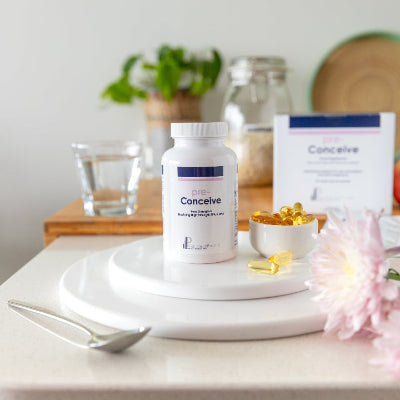Introduction
Conception marks the beginning of one of the most metabolically demanding and nutritionally sensitive periods of human life. From this moment onward, a woman’s body undertakes the extraordinary task of supporting the growth of a new organism. The quality, quantity, and balance of nutrients consumed after conception directly influence not only maternal health but also foetal development, birth outcomes, and long-term disease risk in the child.
Scientists often refer to this window, from conception through the first two years of life, as the “first 1,000 days.” Nutrition during this period exerts lasting effects on metabolism, immune function, and even cognitive potential.
The Science Behind Early Nutritional Needs
After conception, the body experiences profound physiological changes:
- Increased blood volume by 30–50%
- Enhanced nutrient absorption (e.g., calcium, iron)
- Placental development, requiring optimal vascular and metabolic support
- Formation of new tissues such as the neural tube, heart, and skeletal structures
These processes make the post-conception period a critical window for nutritional adequacy. Deficiencies or imbalances can cause irreversible developmental issues, especially during the first trimester when organogenesis occurs.
Key Nutrients for Post-Conception Health
Folate (Vitamin B9)
- Role: Essential for DNA synthesis and cell division. Prevents neural tube defects (NTDs) such as spina bifida.
- Sources: Leafy greens, legumes, citrus fruits, fortified grains.
- Recommendation: 400µg/day, ideally continued from preconception into the first trimester.
Iron
- Role: Supports oxygen transport and prevents maternal anaemia, which is linked to preterm birth and low birth weight.
- Sources: Lean red meat, lentils, spinach, fortified cereals.
- Recommendation: At least 10mg/day during pregnancy.
- Scientific note: Iron absorption increases naturally during pregnancy due to reduced hepcidin levels.
Calcium
- Role: Builds foetal bones and teeth while maintaining maternal bone density.
- Sources: Dairy, tofu, almonds, leafy greens.
- Recommendation: 1,000–1,300 mg/day.
Vitamin D
- Role: Enhances calcium absorption and supports immune and brain development.
- Sources: Sunlight, fatty fish, fortified milk.
- Recommendation: At least 1,000IU/day (though some experts suggest higher in low-sunlight regions).
Omega-3 Fatty Acids (DHA and EPA)
- Role: Critical for brain and retinal development; may lower risk of preterm delivery.
- Sources: Fatty fish (salmon, sardines), flaxseed, chia seeds, algae-based supplements.
- Recommendation: At least 2g of Omega-3 per day, with sufficient EPA and DHA.
Protein
- Role: Fundamental for foetal tissue growth, including the brain and placenta.
- Sources: Eggs, poultry, legumes, nuts, dairy.
- Recommendation: ~1.1 g/kg body weight/day (about 25g more than pre-pregnancy needs).
Micronutrient Synergy and Timing
Nutrition after conception is not just about individual nutrients, it’s about biochemical synergy. For instance:
- Vitamin C enhances iron absorption.
- Vitamin D and magnesium optimise calcium utilisation.
- Folate and vitamin B12 work together in methylation reactions essential for DNA stability.
Timing is equally important: nutrient availability during early embryogenesis (weeks 3–8) can determine the structural integrity of organs and systems. This is why many health professionals recommend prenatal supplements even before the first missed period.
Preparing for Pregnancy can ensure that essential nutrients are in place before conception.
Long-Term Implications: The Developmental Origins Hypothesis
Research in epigenetics has shown that nutrition in early pregnancy can “program” genes involved in metabolism, immunity, and neurodevelopment. Known as the Developmental Origins of Health and Disease (DOHaD) hypothesis, this concept links early-life nutrition to adult-onset conditions like:
- Obesity
- Type 2 diabetes
- Cardiovascular disease
- Cognitive impairment
For example, maternal undernutrition has been associated with increased insulin resistance in offspring, while excessive calorie intake may predispose to obesity later in life.
Practical Tips for Post-Conception Nutrition
- Start a prenatal multivitamin early, ideally one that covers your personalised needs.
- Eat balanced meals rich in whole grains, lean proteins, colourful vegetables, and healthy fats.
- Stay hydrated, pregnancy increases fluid requirements.
- Limit caffeine, (≤200 mg/day) and avoid alcohol and unpasteurised foods.
- Exercise, to support your natural pregnancy weight.
- Include probiotic-rich foods (yogurt, kefir) to support gut and immune health.
Conclusion
Nutrition after conception is not merely about “eating for two”; it’s about building the foundation for two lives. Every vitamin, mineral, and calorie contributes to the intricate symphony of foetal development and maternal adaptation. Investing in nutrient-rich, balanced eating during this period is one of the most effective ways to ensure a healthy pregnancy and a thriving child.
Some additional resources can be found here:






